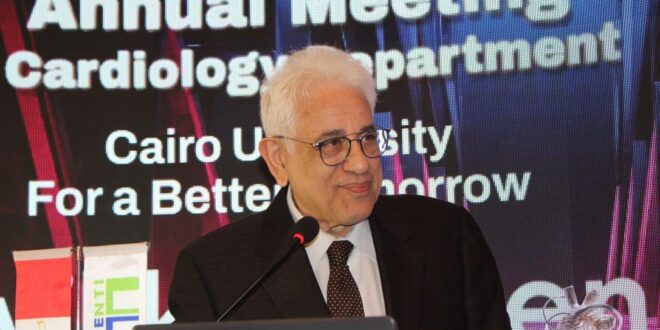Dr. Hossam Badrawi’s Speech at the Opening of the Cardiology Conference at Kasr Al-Ainy, Tuesday, April 29, 2025, at the Grand Nile Tower Hotel
Ladies and gentlemen, esteemed guests,
My gratitude and affection to my friend and mentor, Dr. Galal El-Saeed, and my warm regards to the esteemed son, Prof. Dr. Hesham, Head of the Cardiology Department.
It is an honor for me to join you in the opening of this distinguished scientific conference.
Although my specialization is in obstetrics and gynecology, and my passion lies in public service, culture, and politics, I believe there is a deeper connection between the heart and woman that transcends the boundaries of medical specialties.
I asked myself: Does the heart have a memory?
The answer varies between science, literature, and philosophy.
In science,
Biologically, the heart does not possess memory as the brain does.
However, it is strongly affected by psychological and emotional states and retains a “physiological imprint” of experiences—like the quickening of its beat when we see someone we love, or when we remember a painful moment.
It has been scientifically proven that the nervous system surrounding the heart (known as the “heart brain”) contains a network of neurons that send signals to the brain and influence mood and emotions.
It is as if the heart has emotional memory, if not cognitive memory.
In philosophy and literature,
Yes, the heart is seen as a repository of emotional memories.
Hearts “remember” those they loved, those who hurt them, and those who passed by without offering peace.
Gibran Khalil Gibran says:
“The heart knows today what the mind missed yesterday.”
And the poet says:
“The heart remembers those it loved, even if distant…
And the eye tears up if it sees them or they drift away.”
In human understanding,
The heart is a symbol of emotions and sentiment.
When we say, “My heart still remembers her,” we do not mean the organ itself, but the emotional essence tied to her.
So yes… the heart does have memory, but not just of flesh and cells — of longing and yearning.
The heart, as we understand it today, is not merely a pump that circulates blood through the body.
It is the center of emotional expression, a mirror of the psychological state, and a silent partner in every moment of life — and a loud one in times of anxiety and stress.
And the woman…
That being governed by a brilliant cycle of hormones — not just physical triggers, but hidden dancers that affect mood, inner rhythm, and the very beat of the heart.
Estrogen, which grants a woman her femininity and tenderness, plays a vital role in protecting her heart from diseases.
And when its levels decline with age or in certain conditions, we witness how the rhythm of the heart itself changes — as if the body begins writing a new chapter in its inner story.
I see that the heart and woman engage in an ongoing silent dialogue —
A dialogue that holds science, poetry, and many secrets that we continue to uncover, day after day.
Therefore, when we study heart diseases, we must read the body with a broad human spirit —
To treat heartbeats not as mere numbers, but as living poems written in the language of hormones and emotions.
Ladies and gentlemen,
Let your hearts speak as your hands do in science.
Let them beat not only with blood, but with knowledge and love.
For in every heartbeat… lies a human story.
A salute to the heart of humanity… the heart of science… the heart of life.
Thank you for granting me this opportunity to speak from my heart before the scholars and researchers of hearts.
 Dr. Hossam Badrawi Official Website
Dr. Hossam Badrawi Official Website


